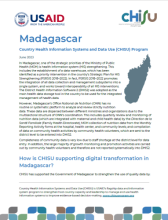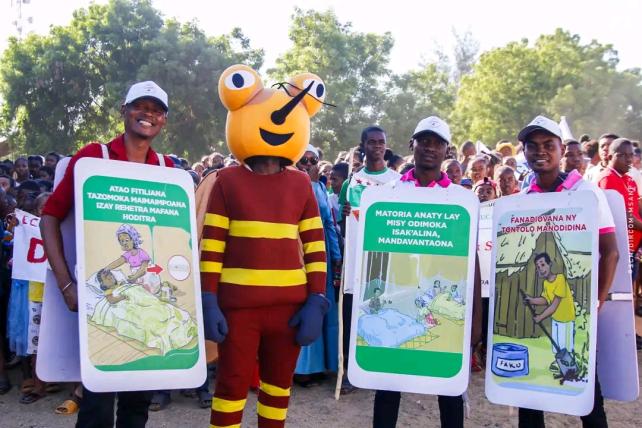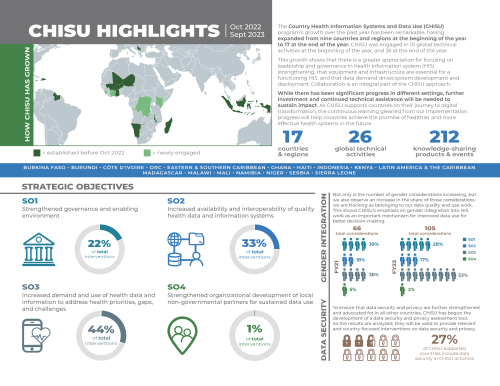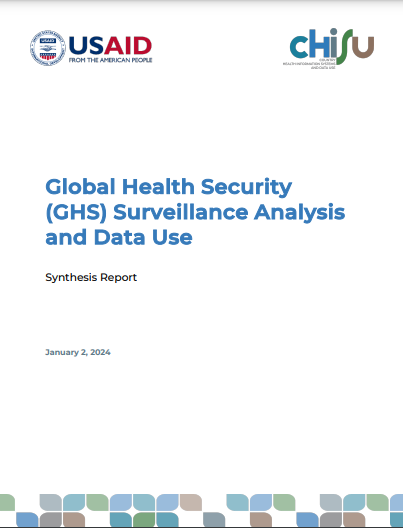Madagascar
CHISU has supported the Government of Madagascar to strengthen the use of quality data.
Conducting an HIS maturity assessment
CHISU collaborated with the MOH, particularly the Direction des Etudes et de la Planification et du Système d’Information (DEPSI), health program managers, and existing HIS partners in conducting a Stages of Continuous Improvement (SOCI) assessment to measure the actual status of the HIS. The output included future HIS goals as well as HIS priorities to be included in the development of the HIS strategic plan 2023–2027. The assessment also helped HIS stakeholders gain a better understanding of the progress made in strengthening the HIS overtime, as well as chart a roadmap toward improvement. The assessment also provided important context for the ONN digitization needs assessment.
Conducting a High Performing Health Care (HPHC) tool assessment
CHISU supported the implementation of the USAID-developed HPHC assessment tool—which measures the accountability, affordability, accessibility, and reliability of the health care system—by working with the Mission to identify the target respondents and key stakeholders who should be engaged in this effort. CHISU also translated the HPHC website into Malagasy to facilitate feedback from a wider number of participants and to support dissemination of results. CHISU contacted the relevant stakeholders and provided them with unique links to complete the survey as well as follow up to encourage maximum participation. The results of the assessment were compiled and analyzed and shared in a half-day stakeholder meeting. Overall, 133 people participated in the assessment. The results highlight areas that work well and those that need to be improved, and serve as a benchmark for future evaluation.
Assessing the ONN’s digitization needs
CHISU evaluated what is needed to digitize the information system of the ONN in three phases: 1) a scoping exercise determined the parameters of the digitization assessment; 2) identified data and information needs and determined what digital health solution/system is necessary; and 3) developed a costed operational plan for systems/processes that can adapt to the needs of the nutrition program and respond to any evolving need. Short-term activities include establishing a regulated environment conducive to the interoperability between ONN and MOH systems and supporting ONN in leveraging the newly established nutrition sector digitization technical working group (TWG) to rally stakeholders behind a common vision. Medium-term activities include configuring the interoperability between ONN and DHIS2 instances and continued support to the TWG to ensure sustainability of systems. Long-term activities include configuring and implementing the collection of nutrition data.
In FY23 and FY24, CHISU will support the Government of Madagascar to strengthen the design, development, and implementation of HIS related to malaria, maternal and child health, family planning, and nutrition. CHISU will strengthen national strategic documents; build capacity in generating and using quality data; and leverage existing platforms for collaboration and coordination between stakeholders, among other activities.

Activity Updates
Addressing Malaria with Better Coordination in Madagascar

In Madagascar, we supported the National Malaria Control Program to update its Malaria Elimination Plan 2023-2027 to guide coordination and monitoring of malaria elimination progress, aligning interventions to address emerging challenges. Read more ›
Blog Posts
Collecting and using health information is an important part of health workers’ jobs. While we have made great strides in moving from paper-based records to digital health information systems, data that both health workers and policy makers need is often scattered across multiple information systems that cannot “talk” to each other. This means that health workers have to spend more time entering and finding data in multiple places and results in an incomplete view of both patient and community health. Read more ›
Resources

CHISU Highlights from October 2022–September 2023
The Country Health Information and Data Systems Use (CHISU) program experienced remarkable growth from October 2022–September 2023, expanding from nine countries and regions at the beginning of the year to 17 at the end of the year. CHISU was engaged in 10 global technical activities at the beginning of the year, and 26 at the end of the year.

Global Health Security (GHS) Surveillance Analysis and Data Use
This study assessed the gaps in the use of disease surveillance data for public health emergencies in Burkina Faso, Burundi, Ghana, Kenya, and Madagascar to identify opportunities for better integration of surveillance data with both routine health data and non-health data.